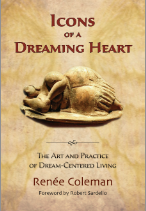Dreaming has everything to do with essentialism. This is one of the reasons that there are what’s known in the film industry as “jump cuts” in dreams, where we are in one location, for example, and then another location altogether, or with different people suddenly, or in different seasons, or different times of day, in different circumstances, or in what feels like an entirely different scene.
This is because the dreamtime has a much different relationship to time than most of us moderns do. Time in dreams is not a thing. Nor is it a commodity. It is not something we can buy (I once heard a fellow in a phone store asking to buy more time, “I need way more minutes,” he said, sounding quite exasperated in the days before “unlimited” everything.) Time is also not something that we can “manage” or manipulate into slots on a calendar, however we may fantasize of doing just that. No, time in the dreamtime is an image; it is an idea that shapes and forms life. Therefore it helps to imagine time in dreams as a being that we are invited to move into relationship with.
So, because dreams endeavor to show us, sometimes in great and intricate detail, what’s essentially important, we want to pay particular attention to the jump cuts in our dreams—to where they appear, to what came before them, and to what comes after. For example, let’s say you dream of standing outside a house. It’s a dream house, but somehow you recognize it as “yours.” The next thing you know there’s a jump cut and you’re inside the kitchen of this house, cooking. There’s a woman standing next to you, also cooking. She is someone who is not familiar to you from the waking-‐world, but you seem to know one another quite well in the dreamtime, as if you are old friends. You have a conversation, though no words are actually spoken. It’s more like a conversation that you share on a cellular level, or through osmosis—a bodily kind of knowing made possible precisely because of the particular way that you standing alongside one another and cooking. What your friend tells you during this conversation is deeply significant. And, though it has everything to do with putting things together in the kitchen, when you wake up you cannot remember what was said (even though it felt as though it held the keys to the universe while you were dreaming.) But then you leave the kitchen. You have the sense—a deep kind of knowing and satisfaction—that your dream friend will take care of things for you in the kitchen. So you go out then into a living room receiving area, where you lie down on a small cot. You close your eyes and get very, very still. You have the sense that you are waiting for what comes next when the dream ends.
What’s important here with the jump cut is not how you go inside the house but that you go inside. It doesn’t matter, from the dream’s perspective, how you get there. In other words, the dream is far more interested in highlighting the fact that you go from outside to inside.
Once inside, it matters where you are and what you’re doing. The details of the conversation between you and your dream friend don’t matter, otherwise, of course, you would remember what was said. But what does matter is that there is a bodily knowing conversation that takes place between you and your friend. And this “imaginal sharing” between you has everything to do with putting things together alongside one another in the kitchen and letting them cook.
But now, because the dreamtime lets us in on the move from the kitchen to the living-room receiving area, we know that it matters. In other words, because it’s not a jump cut we know that how you go from the kitchen to the living-room receiving area is important. So let’s take another look.
James Hillman reminds us that of all the “re” words, maybe the most important is re‐spect, which means to look again. He suggests that taking another look is all that psychology does—the whole thing in a single word! In Inter Views: Conversations with Laura Pozzo on Psychotherapy, Biography, Love, Soul, The Gods, Animals, Dreams, Imagination, Work,Cities, and the State of the Culture, James Hillman says:
That’s what our dreams are doing and our memories: bringing us to respect ourselves—not inspect with guilt—to re-‐gard what happened yesterday, what happened in childhood and re-‐spect it. We look again at what was forgotten or repressed, when even look again at the mechanisms of forgetting and repressing, and whatever we look at again we gain a new respect for—whether in ourselves or in the culture. But to do this, you have to let it be as it is and not try to up-‐date it, make it new. Just looking again, the respect, renews it.
In Greek mythology, Hestia was the goddess of the home and hearth. And, as she presided over the right ordering of the family and all things domestic, every household hearth was imagined as her altar. She was considered so important, so essential to the ancient Greeks, that at ceremonial assemblies, Hestia was offered both the first and the last sacrificial offering.
Our modern day kitchens, of course, are like Hestia’s hearths (which is why people always congregate in the kitchens at parties.) Don’t we know intuitively that the kitchen is where all sorts of dreaming, alchemical magic is mixed and made possible? The kitchens in our bodies—where the alchemical magic is mixed and made possible—are located in our stomachs.
So we know that, imaginally speaking, going inside matters. Then what matters is that you tend to what you have put together over the fire of being together with the dream companion. You do this just long enough to notice it, to know that it’s going on, and to recognize that it’s significant. When you leave the kitchen, how you leave matters. How do you leave? In faith, knowing that your dream friend will tend to things in the kitchen, in the hearth of being between you, that is, between what you and your dream companion have created together. And it’s out of this, out of what you are co-‐creating (still and now and now) that you freed up to go off then to engage with what comes next, which, of course, takes place in the living room receiving area.
What’s essential about this living room receiving area is that you enter it in a state of faithfulness. There is a certain kind of knowing you have that your friend is tending to things in the kitchen. Thus you are prepared to enter the living room receiving area, to then lie down and wait with receptivity and with patience expectation for what comes next. But the dream ends without you knowing what comes next. In other words, what comes next isn’t revealed because it doesn’t matter. What matters, therefore, is that you are left with the knowing that something does indeed come next, and that you are rendered able to wait, in stillness and in silence, for it. But now you also know that what’s essential for you to get to this place of living receptivity has everything to do with your going inside in the first place, and with co-‐ creating the hearth of being between you and the dream companion— with She Who Tends to Things in the Kitchen—so that you can then move into what comes next in a state of faithfulness. In other words, it’s a faithfulness that knows that the companion is tending to things; it gives you the kind of faith that is required for what comes next. I am reminded here of that marvelous poem in Rilke’s Book of Hours:
She who reconciles the ill-‐matched threads
of her life, and weaves them gratefully
into a single cloth—
it’s she who drives the loudmouths from the hall and clears it for a different celebrationwhere the one guest is you. In the softness of evening it’s you she receives.
You are the partner of her loneliness,
the unspeaking center of her monologues.
With each new disclosure you encompass more and she stretches beyond what limits her,
to hold you.
(I, 17—translated by Anita Barrows & Joanna Macy)
The dreamtime invites to move towards the Time Being in dreams on its terms rather than our own. Jump cuts therefore highlight how dreams want us to pay attention, and what they want us to pay attention to, precisely. In other words, they put things alongside one another in such a way that we see them in the context of the whole, and for what capacities of soul we are being asked to develop.




0 Comments